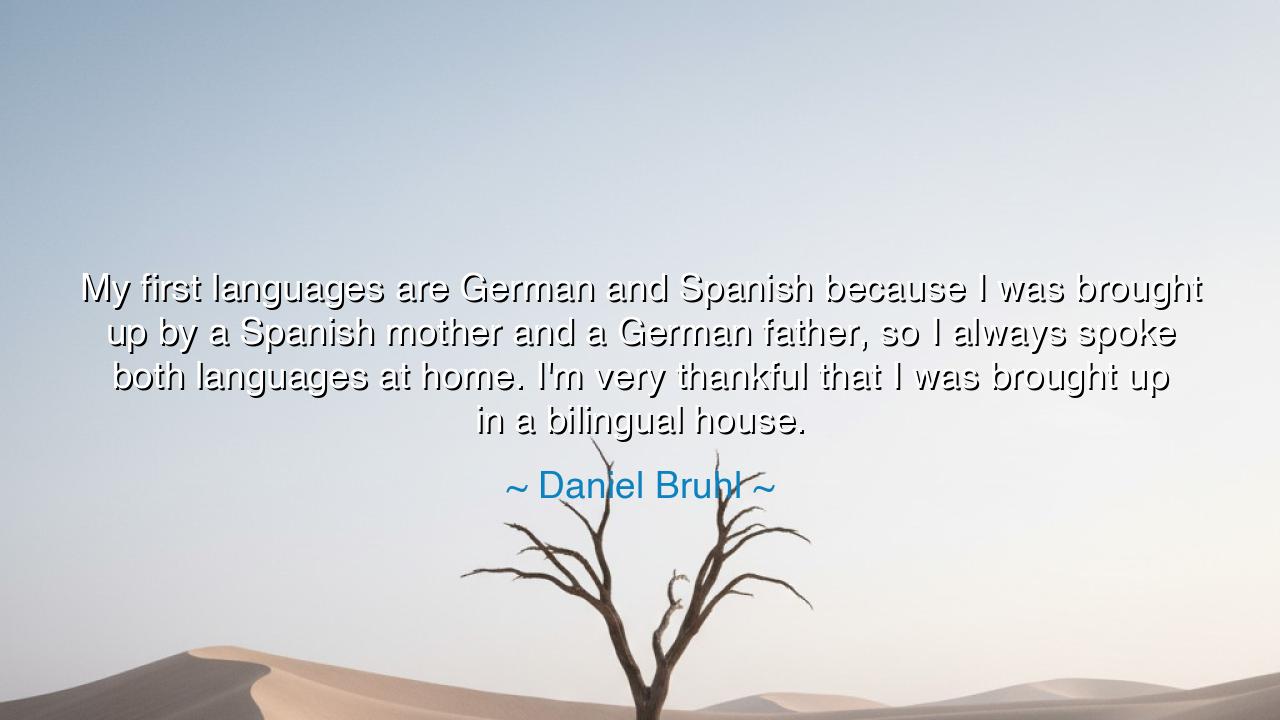
My first languages are German and Spanish because I was brought
My first languages are German and Spanish because I was brought up by a Spanish mother and a German father, so I always spoke both languages at home. I'm very thankful that I was brought up in a bilingual house.






Hear the words of Daniel Brühl, spoken not as boast but as gratitude: “My first languages are German and Spanish because I was brought up by a Spanish mother and a German father, so I always spoke both languages at home. I’m very thankful that I was brought up in a bilingual house.” In this confession is not merely the story of a man’s childhood, but a song to the power of language, to the bridge between peoples, and to the strength that comes when two cultures dwell together in one soul.
From the beginning of time, tongues have divided and united mankind. The Tower of Babel, as told in sacred text, speaks of how one speech was scattered into many, causing confusion among nations. Yet here, in Brühl’s life, we see the reversal of Babel’s curse: in his home, Spanish and German coexisted in harmony. Where others find division, he found union. His house became a living bridge between lands, proof that the human heart can hold more than one song and still remain whole.
History bears witness to the greatness that springs from such blending. Consider Alexander the Great, born of a Macedonian father and an Epirote mother, taught both the arts of war and the wisdom of philosophy. In him two traditions met, and from that union came the vision of a world not divided but joined. Or recall the poet Rainer Maria Rilke, who wrote in German but drew from the soul of many lands, his verses carrying echoes of French and Russian thought. Brühl’s bilingual house belongs to this lineage: places where multiple roots intertwine, producing strength beyond measure.
There is thankfulness in his words, for he knows this gift was not of his own making. A child does not choose his languages, nor the culture into which he is born. Yet Brühl honors his fate, acknowledging that what might have been merely chance has become a treasure. For with every new tongue, one gains a new vision of the world. To speak in Spanish is to taste warmth, rhythm, and passion; to speak in German is to touch precision, structure, and depth. To carry both is to walk with two lamps, each illuminating different paths.
But let us not think this gift without struggle. To live between two worlds is to be questioned by both, to belong everywhere and nowhere. Yet therein lies its secret power: the bilingual soul becomes a wanderer who is never lost, a mediator who can reconcile difference, a vessel through which cultures meet without conflict. In Brühl’s simple memory of childhood conversation lies a profound teaching for nations: unity begins at the hearth, where voices blend without rivalry.
The lesson is clear: cherish your languages, whether one or many. For each tongue you learn is not just a tool, but a new way of seeing, a new key to the door of another’s heart. If you are given the gift of more than one language, guard it, cultivate it, and pass it on to your children. And if you know but one, do not let pride make you blind—seek to learn another, that your soul may expand beyond the borders of your birth.
Practical wisdom calls you to action: speak with elders in their tongue, teach your children even a few words of another language, read poetry or scripture in a foreign voice, let your mouth stumble and your mind grow. For in each word of another culture lies a treasure chest of thought, waiting to make you richer. Do not say, “I am too old,” for the ancients taught that to learn is to stay young in spirit.
Thus, from Brühl’s remembrance of his bilingual house, let us learn to honor the bridges of culture and tongue. For he is not merely thankful for his own past—he is a herald to us all, showing that in the meeting of Spanish and German, in the union of father and mother, lies the eternal truth: that to live between two worlds is not division, but abundance. And the one who carries more than one voice carries within himself the power to heal the separations of the earth.






AAdministratorAdministrator
Welcome, honored guests. Please leave a comment, we will respond soon